McLintock!

Brief Synopsis
Cast & Crew
Andrew V. Mclaglen
John Wayne
Maureen O'hara
Patrick Wayne
Yvonne De Carlo
Stefanie Powers
Film Details
Technical Specs

Synopsis
Ranchers in the southwestern town of McLintock try to force a group of homesteaders out of the area, and George Washington McLintock, ripsnorting cattle baron and the town's leading citizen, finds among them a lovely widow, Louise Warren, whom he hires as a cook. With Louise is her small daughter and her handsome son, Dev. McLintock's estranged wife, Katherine, returns from the East to insist on a divorce and to get custody of their daughter, Becky, who is returning from college. Becky finally arrives, bringing with her a Harvard boy, Matt Douglas, Jr., whose father is one of McLintock's old enemies. Young Douglas' presence leads to fisticuffs with Dev, who is also courting her. In addition to the violent arguments of Katherine and McLintock, there is more trouble when a band of Comanche Indians just released from prison arrives in town to make a final stand against the white man. Dev and Becky announce their engagement when this crisis subsides, but McLintock, roused to an exasperated fury by Katherine's jealousy and stubborness, chases her through the town and, upon catching her, gives her a solid spanking, much to the delight of the onlookers. After he tells her to go ahead and get a divorce, Katherine throws herself into his arms, and the McLintocks are together again.

Director

Andrew V. Mclaglen
Cast

John Wayne
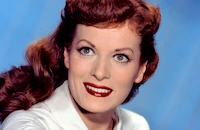
Maureen O'hara
Patrick Wayne

Yvonne De Carlo

Stefanie Powers
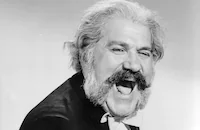
Jack Kruschen
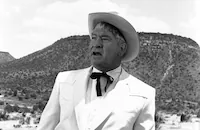
Chill Wills
Jerry Van Dyke

Edgar Buchanan
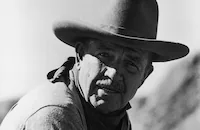
Bruce Cabot

Perry Lopez

Michael Pate
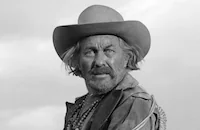
Strother Martin

Gordon Jones
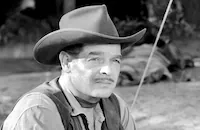
Robert Lowery
Edward Faulkner
H. W. Gim
Aissa Wayne
Chuck Roberson
Hal Needham
Pedro Gonzales Jr.
Hank Worden
Leo Gordon
Mary Patterson
Ralph Volkie
Dan Borzage
John Stanley
Kari Noven

Mari Blanchard
Crew
Frank Beetson Jr.
Richard Chaffee
William H. Clothier
Gordon Cole
Sam Comer
Frank Devol
Frank Devol
Dunham
"by" Dunham
James Edward Grant
Eddie Imazu
Howard Joslin
Richard Kuhn
Bill Lewis
Otho Lovering
Cliff Lyons
Robert E. Morrison
National Screen Service
Earl Olin
Web Overlander
Frank Parmenter
Ann B. Peck
Hal Pereira
Lorraine Roberson
Darrell Silvera
Jack Solomon
Michael Wayne

Videos
Movie Clip



Hosted Intro
Film Details
Technical Specs

Articles
McLintock!
The Duke takes the title role of George Washington McLintock, an aging, self-made, hard-drinking cattle and land baron who has made his mark on his frontier town, right down to its name. For all his accomplishments, he still feels a gnawing dissatisfaction with his current lot in life. He's disgusted with the federal government's encroachments into the community, from the constant flow of homesteaders promised barely tillable soil, to the prospect of certain violence if the local Indian tribesmen are forced onto reservations.
He's also quietly disconsolate because it's been two years since his willful, beautiful wife Katherine (Maureen O'Hara) left their spread without a word to return to her blue blood, high society circles back east. After a run-in with headstrong young homesteader Devlin Warren (Patrick Wayne), he offers the kid a position as a ranch hand, and takes on his attractive, widowed mom Louise (Yvonne De Carlo) as a badly needed house cook.
The complications percolate further when Katherine re-enters G.W.'s life, full of airs and determined to obtain both a divorce and custody of their teenaged daughter Becky (Stefanie Powers), presently due back from her first year at college. McLintock spends the balance of the narrative dealing with the corrupt and incompetent local politicos, refereeing for the quarreling but mutually attracted Becky and Devlin, and convincing Kate of her proper place in a slapstick if chauvinistic finale.
The McLintock! set was packed with Wayne's family and old cronies. Beyond the roles for son Patrick and daughter Aissa, his eldest, Michael, earned his first credit as producer. The supporting cast included such friends and colleagues as Chill Wills, Bruce Cabot, Edgar Buchanan, Chuck Roberson and Bob Steele. The directing chores were handled by Andrew V. McLaglen, whom Wayne had watched grow up over years of co-starring with his father Victor in projects like The Quiet Man (1952). In fact, John Ford took over the chair for a few days in the production of McLintock! when McLaglen fell ill.
Wayne had badly wanted to work with O'Hara again since The Quiet Man, and their climactic cross-town scuffle is patently evocative of that film's knockabout yet sentimental denouement. In her autobiography 'Tis Herself, O'Hara recalled the perils of doing her own stunt work for the water-trough plunge. "Had I fallen too long, I'd have snapped my neck. Too short and I'd have snapped my arms and legs. If my elbows had not been tucked in tightly enough to my body, I'd have broken my arms and shoulders as well...At forty-two years of age, you'd think I'd have known better."
Wayne was also determined to ensure that De Carlo received her featured role. De Carlo's husband was another old colleague, stuntman Bob Morgan; he sustained career-ending injuries in an on-set accident during the shooting of How the West Was Won (1962).
Producer: Michael Wayne
Director: Andrew V. McLaglen
Screenplay: James Edward Grant
Cinematography: William H. Clothier
Film Editing: Bill Lewis, Otho Lovering
Art Direction: Eddie Imazu, Hal Pereira
Music: Frank De Vol
Cast: John Wayne (George Washington McLintock), Maureen O'Hara (Katherine McLintock), Patrick Wayne (Devlin Warren), Stefanie Powers (Becky McLintock), Jack Kruschen (Jake Birnbaum), Chill Wills (Drago).
C-127m.
by Jay S. Steinberg

McLintock!
McLintock! (Collector's Edition) on DVD
With a volatile chemistry unrivaled in Hollywood, few couples demonstrated the explosive potential of a lovers quarrel more garishly on screen than John Wayne and Maureen O'Hara in the classic comedy western, McLintock! (1963). Recently released by Paramount Home Video, as a Special Collector's Edition DVD, McLintock! details the all too familiar love/hate dichotomy that drives some to the brink of insanity. A rather conventional theme for romantic comedy, this film presents an interesting twist on Shakespeare's The Taming of the Shrew by incorporating an unexpected Wild West setting and a slew of sensational stunts. Featuring a corral full of stars willing to get their funny bones dirty, McLintock! ultimately delivers big laughs, for as outlandish as this film might be certain principles of humor ring universally true.
Having first settled the territory, cattle baron George Washington McLintock (John Wayne) remains content to lead the raucous lifestyle that he and many other folks adopted as pioneers. The head honcho in a town baring his name G.W. lives by the "work hard/play hard" philosophy, unfortunately the latter half of this credo has a price. In G.W.'s case this leisure tax comes in the form of his prim and proper wife Katherine (Maureen O'Hara). In returning to McLintock, after a two-year hiatus from her husband, Katherine intends to pick up right where she left off, smack dab in the middle of a domestic dispute. As daughter Becky (Stefanie Powers, who you may recognize from the 1980's TV series Hart to Hart) comes home from college, the young girl's future remains a topic under parental review. Here the stage is set for Katherine to launch her attack, as this insubordinate wife makes every effort to regain custody of Becky and return to the refinements of the east, in spite of G.W.'s thoughts on the subject. Thus the proverbial first shots are fired, as Katherine and G.W. lock horns verbally and buck head physically, in one of this fiery duo's most entertaining and memorable performances. Despite rodeos, fistfights, an Indian raid, and a spanking or two (yes, you heard me right, an old fashioned spanking) Katherine still finds time to "rub salt in the wound." Severely aggravated, but still in love, G.W. retaliates (in a style befitting of John Wayne) and no man, woman, or child can evade the mayhem of this last ditch effort to save his marriage.
Directed by Andrew V. McLaglen, son of actor Victor McLaglen (who appeared with Duke in John Ford's heralded "Cavalry Trilogy"), McLintock!'s rowdy sense of humor remains the film's signature. Well suited for the likes of John Wayne and Maureen O'Hara, the hilarity culminates in an absurd skirmish awarded its own featurette on the Collector's Edition DVD entitled, "A Good Ol' Fashion Fight." As tempers flare between G.W. and Jones (Leo Gordon, who appeared beside Duke in 1953's Hondo), McLintock vows, "Oh, I know...I'm going to use good judgment. I haven't lost my temper in 40 years, but pilgrim you caused a lotta trouble this morning...mighta got somebody killed... and somebody oughta belt you in the mouth...but I won't...I won't." Here Wayne takes a dramatic pause before uttering, "The hell I won't!" and roundhouses Gordon right across the face, sending this character down an adjacent mudslide and inciting the rest of the cast into a frenzy of fisticuffs. As everyone and their neighbor joins in on the messy melee, stunt coordinators and stars alike descend the slimy shoot of bentonite in a fight sequence for the ages. Even Maureen O'Hara, still recovering from earlier stomach surgery, slips in the mud and glides into the dreaded pool below. O'Hara describes this scene in full detail when interviewed for the bonus featurette and has absolutely no qualms about telling the viewer what a miserable time she had filming this particular segment. With that said, the brawl alone is worth the price of admission and the accompanying interviews should only heighten one's appreciate for the choreographed chaos.
McLintock! proves to be as pleasurable to watch as it was to make (Maureen's complaints about the mud aside). The success of this film, undoubtedly a product of the relationships John Wayne maintained off camera, resulted in a much needed box office success. A Batjac film (the production company founded by John Wayne and Robert Fellows), McLintock! rejuvenated a company that had carried several less profitable films over the previous years. In casting friends and family, a fairly routine practice for Batjac, Wayne bet on such trusted figures as Chill Wills, Bruce Cabot, Michael Pate, Chuck Roberson, and his sons Patrick and Michael Wayne. Having worked in front of the camera with his father on such films as The Searchers (1956), The Alamo (1960), and The Comancheros (1961), Patrick Wayne in the role of Devlin Warren (G.W.'s cowhand and Becky's primary suitor), stepped from behind Duke's towering shadow and truly established himself as a commodity in Hollywood. Although Patrick would continue to appear with his father in films such as Green Berets (1968) and Big Jake (1971), other opportunities soon arose including roles alongside Jimmy Stewart in Shenandoah (1965) and starring roles in Beyond Atlantis (1973) and Sinbad and the Eye of the Tiger (1977). McLintock! also enabled Michael Wayne to display his skills as a savvy businessman. Although Michael at one point had aspirations of attending law school he found himself drawn to the film industry and with the aid of his father, Michael slowly ascended the ranks of the studio system. With an inaugural effort as producer on McLintock!, Michael cemented his career in Batjac's front office and would later produce such titles as Chisum (1970), Cahill U.S. Marshal (1973), and McQ (1974). As a homage to his career the Collector's Edition DVD includes a featurette entitled, "The Batjac Story Part 2: The Legacy of Michael Wayne." This documentary outlines Michael's remarkable achievements, most importantly those accomplishments eclipsed by the success of his father. Dedicated to Duke's legacy, Michael Wayne oversaw the operation of Batjac along with two other major ventures. With his father's passing in 1979 (after a second bout with cancer), Michael Wayne helped develop the John Wayne Cancer Institute, eventually becoming Chairman of the Board. This organization, dedicated to finding a cure for cancer, uses the Wayne name as a means of drawing attention to an otherwise silent killer. In addition to this cause, Michael Wayne also managed the daily operations of Wayne Enterprises, a company that still oversees the licensing of John Wayne merchandise. One can only marvel at Michael Wayne's dedication to his father, and we the viewers certainly owe him a great deal since his diligent efforts (until his death in 2003) led to the restoration of several John Wayne classics, including McLintock!.
Presented in brilliant Technicolor via a colossal aspect ratio of 2.35:1, McLintock! remains a timeless comedy classic. With commentary from Leonard Maltin, Maureen O'Hara, Stefanie Powers, Michael Pate, Michael Wayne, Andrew McLaglen and others, this Special Collector's Edition DVD draws informative and comical stories from numerous sources, each invaluable additions to this home video.
For more information about McLintock!, visit Paramount Home Entertainment. To order McLintock!, go to TCM Shopping.
by Christian Pierce
McLintock! (Collector's Edition) on DVD
TCM Remembers - Jack Kruschen
Jack Kruschen (1922-2002)
He may have not been a household name, yet his career consisted of over seventy-five films, spanned over six decades, and displayed a strong versatility in playing either dramatic or comic roles with equal effectiveness. He was the definitive, "I can't quite remember the name, but I remember the face" character player who enlivened many films with his robust frame, cherubic face and infectious smile. His name was Jack Kruschen, a superb performer who died on April 2, 2002 at the age of 80, leaving behind a strong body of work that was impressive as any character actor of his generation.
Kruschen was born on March 20, 1922 in Winnipeg, Manitoba, Canada. The son of a watchmaker who later set up shop in Hollywood, he was performing in an operetta at Hollywood high school when a talent scout for CBS radio discovered him. Kruschen was soon doing voice characterizations on popular network programs such as Dragnet, The Danny Thomas Show and Sam Spade. With his gift for dialects (he was most adept at playing ethnic types like Greeks, Yiddish or Italians - a skill finely honed in his radio days), Kruschen was a natural for the movies and soon made his film debut with a small role in the Betty Hutton comedy Red, Hot and Blue (1949).
Kruschen's early career is peppered with a variety of roles like a comical gangster in both Abbott & Costello Go to Mars (1953) and Money from Home (1953) starring Jerry Lewis & Dean Martin; a hard-nosed police detective in Confidence Girl (1952) and Julie (1956), an underrated Doris Day thriller; or doomed victims to alien prey in Sci-fi cult classics: the 1953 version of War of the Worlds (fans remember him as Salvatore, one of the first earthlings to be killed by the invading Martians) and The Angry Red Planet (1959). The roles offered steady work, but not much critical recognition. All that changed when Billy Wilder cast him in the key role as Jack Lemmon's bemused but caring neighbor, Dr. Dreyfuss in The Apartment (1960). As the man who observes the steady stream of women in and out of Lemmon's apartment and the one who saves Shirley MacLaine from a drug overdose, Kruschen offered a wonderful performance - viewing his neighbor's proceedings with a jaundiced eye, yet never letting his disdain overtake his humor and humanity. He was justly rewarded with an Oscar nomination as Best Supporting Actor.
From this point on, Kruschen was seldom out of work, appearing in over 40 films (including a terrific dramatic turn in the original Cape Fear (1962) as Dave Grafton, a corrupt southern bigot) and nearly 60 guest roles on television for the next two decades. Kruschen would later find fame toward the end of his career when he was cast as Papa Papadapolis in the hit sitcom Webster (1985-1987) and would show pleasant variations of the "kindly old codger" throughout the remainder of his career - like his final role in the romantic comedy 'Til There Was You (1997). His death in April this year may have gone largely unnoticed by the movie-going public, but for those of us who treasure the art of the character player, Kruschen's passing was a loss that is fortunately compensated by his strong body of work that will be enjoyed for fans of the late show for many years to come.
By Michael T. Toole
SIGNE HASSO, 1910-2002
Actress Signe Hasso died June 7th at the age of 91. She was best-known for starring in A Double Life (1947) but played numerous Europeans in films during the 1940s. Hasso was born on August 15, 1910 in Stockholm, Sweden and began acting on stage at the age of 13. Ten years later made her first film appearance as Signe Larsson. She was married in 1936 and adopted the last name of her husband, cinematographer and later director Harry Hasso. After a dozen Swedish films, Hasso moved to Hollywood in 1940 where her first screen appearance was an uncredited role in Journey for Margaret (1942). A brief stint at RKO didn't lead to any more promising film parts so Hasso concentrated on her stage career in New York City. Eventually, her film career became more active, thanks to a quick succession of roles, most notably in Fred Zinnemann's The Seventh Cross (1944), Douglas Sirk's A Scandal in Paris (1946) and Henry Hathaway's The House on 92nd Street (1945). However it was her portrayal of Ronald Colman's wife in the Oscar-favorite A Double Life that solidified her fame. But as Hasso continued to act on the stage and TV, her film work began to taper off. She appeared in high-profile thrillers like Crisis (1950), several made-for-TV movies, a few European productions and even the cult murder mystery, Bert Gordon's Picture Mommy Dead (1966). In 1972, the king of Sweden decorated Hasso for her work. Her final appearance was in a 2001 documentary about Greta Garbo.
HERMAN COHEN, 1927-2002
One of the key producers of B-movies, Herman Cohen, died June 2nd at the age of 76. Like most producers, his name wasn't generally known outside the industry or the realms of film buffs but most people never forget the titles of his films: I Was a Teenage Werewolf (1957), Horrors of the Black Museum (1959) and the not-quite-immortal Bela Lugosi Meets a Brooklyn Gorilla (1952). Cohen was a Detroit native, born August 27, 1927. He entered the film business in the smallest possible way, as a 12-year-old janitor, often accepting passes for his family and friends instead of wages. Cohen served in the Marine Corps (several articles incorrectly say the Army) before becoming a publicist at Columbia Pictures. By 1951 he was working as a producer's assistant on low-budget independent films, mostly for Realart Pictures run by another Detroit native Jack Broder. Soon Cohen was producing his own movies, including Westerns and mysteries, until hitting big with the famous I Was a Teenage Werewolf. Starring a then-unknown Michael Landon (under personal contract to Cohen who later tore it up so Landon could appear in Bonanza), the film was made for $100,000 but in just a few months grossed over $2 million. Cohen didn't hestitate to turn out I Was a Teenage Frankenstein and Blood of Dracula by Thanksgiving of that same year and before long had made several films that continued to earn money for years to come. (One TCM writer remembers Horrors of the Black Museum turning up in a small Alabama town in the early 70s, over a decade after its initial release. The film is scheduled for a DVD release with a Cohen commentary from VCI Entertainment.) Cohen also made several films in England including The Headless Ghost (1959) and the cult favorite Konga (1961) where Cohen even paid RKO $25,000 for the rights to use the title King Kong in publicity for his own film. Cohen's later movies included a spaghetti Western and Joan Crawford's final acting role Trog (1970). In the 1980s Cohen ran a company, Cobra Media, that distributed some films and licensed material such as Teenage Werewolf to Landon for use in one of his Highway to Heaven episodes.
By Lang Thompson
TCM Remembers - Jack Kruschen
Quotes
I know, I know. I'll use proper judgment. I haven't lost my temper in forty years, but pilgrim you could've gotten somebody killed today and somebody oughta belt you in the mouth, but I won't. I won't. The hell I won't!- George Washington McLintock
I've got a touch of hangover, bureaucrat. Don't push me.- George Washington McLintock
I'm sorry Katherine - that Katie just slipped out from times when I remember you as being nice people...- Drago
Are you going to stand there with that idiotic expression on your face while the hired help insults your wife?- Katherine McClintock
He can't help it - he's ignorant. He doesn't know any better than to tell the truth. And I can't help this silly look on my face - I started acquiring it as you gained in social prominence!- George Washington McLintock
And I am *not* intoxicated...yet!- George Washington McLintock
You know, Drago; if we had any moral character at all, we would be gettin' cleaned up instead of standing here covered with mud drinkin'.- George Washington McLintock
G.W.?- Drago
Drago.- George Washington McLintock
.- George Washington McLintock
Trivia
The "mudhole" in which the famous brawl took place wasn't actually made of mud. It was made of a material called bentonite, which is used in the drilling of oil wells and has the consistency of chocolate syrup. According to actor Leo Gordon (the first one to be knocked down it), that scene took a week to shoot.
Promotional events were postponed for a week following the assassination of John F. Kennedy.
Miscellaneous Notes
Released in United States 1963
Released in United States 1963















